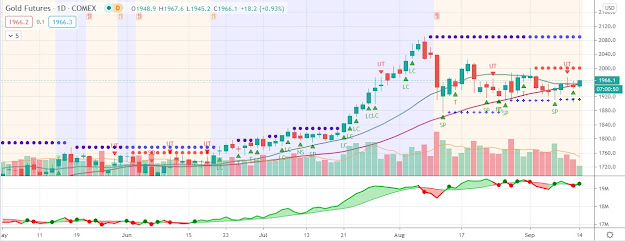After the release of the Fed announcement, the Gold price headed further south
Gold futures extended their losses in electronic trading following today’s Fed meeting. COMEX gold for April delivery settled down by $5.60, or 0.3%, at $1,694.20 per ounce. The FOMC statement revealed that the Ben Bernanke-led Fed intends to maintain its set of “highly accommodative” monetary policies but will not launch a third round of quantitative easing (QE3). After the release of the Fed announcement, the Gold price headed further south, reaching $1,667.40 per ounce as of 3:28pm ET.
Edel Tully, a precious metals analyst with UBS, wrote in a note to clients that the move lower in gold “was entirely on the back of longs getting out, reversing all of the gains since the Jan. 25 FOMC meeting.”
Tully – the most accurate gold price predictor in the 2011 London Bullion Market Association Forecast – added “That prices have been more resilient, falling only 7% despite a 23% decline in positioning, is encouraging, considering that the most recent selloff of similar magnitude – the 21% contraction in the COMEX gold book back in September – resulted in a considerably larger 20% drop in the price of gold. Nevertheless, we maintain some degree of caution at this stage.”
In contrast to Tully, noted hedge fund manager Kyle Bass offered a more constructive outlook for the price of gold on Monday. In a CNBC interview, he stated that “I think that the pattern is set…that we are going to continue to monetize fiscal deficits by expanding central bank balance sheets. Call it what you want. Call it LTRO, call it quantitative easing, or any acronym that the powers that be want to call it. I call it money creation out of thin air, and therefore, gold has got a lot further to go.”
Bass – who runs Hayman Capital Management and has been a long-time gold bull – was also asked about other topics related to the yellow metal. On the subject of gold being taxed in the U.S. as a collectible at 28%, he contended that “I think it should be taxed as any other asset that you own, with the same duration of holding as any asset you own.”
As for a return to a gold standard, Bass responded “I don’t think so. I’m not an advocate of such. Tying our enormous economy to one metal coming out of the ground would probably be a bad idea. But tying it to a basket of goods and services might be a good idea…. Because what we need is to be able to limit the amount of capital coming into the system.”
Edel Tully, a precious metals analyst with UBS, wrote in a note to clients that the move lower in gold “was entirely on the back of longs getting out, reversing all of the gains since the Jan. 25 FOMC meeting.”
Tully – the most accurate gold price predictor in the 2011 London Bullion Market Association Forecast – added “That prices have been more resilient, falling only 7% despite a 23% decline in positioning, is encouraging, considering that the most recent selloff of similar magnitude – the 21% contraction in the COMEX gold book back in September – resulted in a considerably larger 20% drop in the price of gold. Nevertheless, we maintain some degree of caution at this stage.”
In contrast to Tully, noted hedge fund manager Kyle Bass offered a more constructive outlook for the price of gold on Monday. In a CNBC interview, he stated that “I think that the pattern is set…that we are going to continue to monetize fiscal deficits by expanding central bank balance sheets. Call it what you want. Call it LTRO, call it quantitative easing, or any acronym that the powers that be want to call it. I call it money creation out of thin air, and therefore, gold has got a lot further to go.”
Bass – who runs Hayman Capital Management and has been a long-time gold bull – was also asked about other topics related to the yellow metal. On the subject of gold being taxed in the U.S. as a collectible at 28%, he contended that “I think it should be taxed as any other asset that you own, with the same duration of holding as any asset you own.”
As for a return to a gold standard, Bass responded “I don’t think so. I’m not an advocate of such. Tying our enormous economy to one metal coming out of the ground would probably be a bad idea. But tying it to a basket of goods and services might be a good idea…. Because what we need is to be able to limit the amount of capital coming into the system.”




Comments
Post a Comment